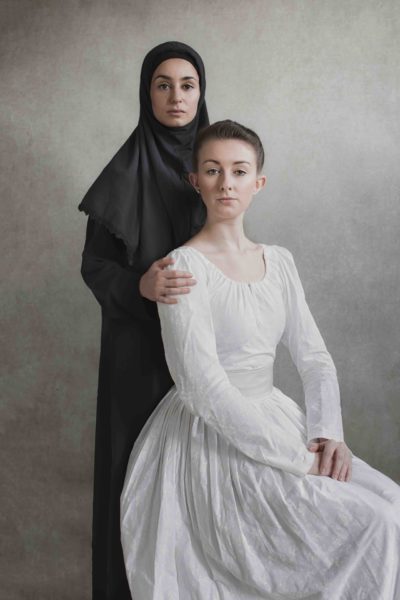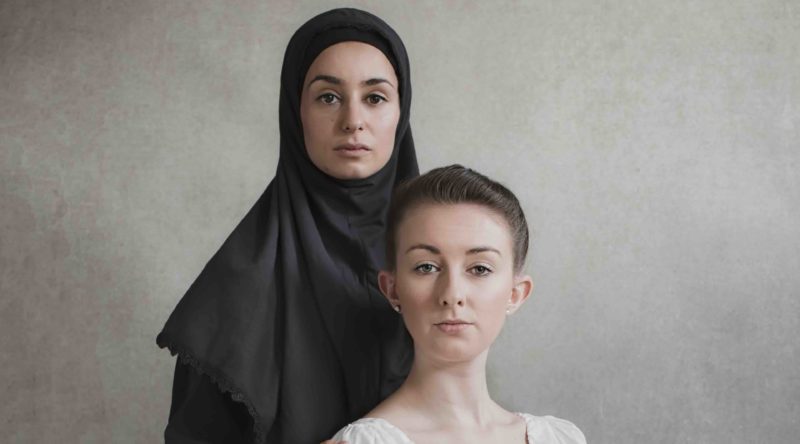INTERVIEW: Brits Off Broadway opens with two one-acts from Henry Naylor

Brits Off Broadway, the annual theatrical festival at 59E59 Theaters in Midtown Manhattan, is set to return this month with a sampling of topical stories pulled from the headlines. Included among the plays is an evening of two one-acts by playwright Henry Naylor.
Angel uses the legend of the the Angel of Kobane, a Kurdish freedom fighter, who some believe killed 100 ISIS fighters in Kobane, Syria. A few years ago, BBC News offered some insights into the story.
Echoes is the second piece on the theatrical bill, and it should be familiar to those who remember last year’s Brits Off Broadway. The show returns to the same stage to tell the story of two women living 175 years apart. One is a Victorian pioneer woman, the other a present-day Islamist schoolgirl.
Both offerings from Naylor allow a dramatic retelling of stories and characters from international headlines. It’s a chance for audience members to receive an intimate look at haunting conflict.
Naylor, in an email to Hollywood Soapbox, stated that he stumbled across the story of the Angel of Kobane.
“Like most people, when ISIS was steamrolling its way through Iraq and Syria in 2014, I kept watching the news with appalled fascination,” he wrote in an email. “At the time, they seemed unstoppable. It really looked like they might take the entire region. The turning point was the siege of Kobane. Kobane’s a small border town near Turkey. IS assumed they were going to take it easily — like all the other towns they’d conquered in the region. After all — the jihadis had a huge arsenal of tanks, Humvees and howitzers, which they’d looted from the fleeing Iraqi army.”
He added: “But the people of Kobane, armed only wth aging Russian rifles, decided to take them on, and with air support from America, they drove ISIS back. The siege was one of the major events of the millennium so far — and it was barely covered because western journalists weren’t in the area. They’d all fled themselves, fearing IS’ brutality.”
Naylor was intrigued by how the Kurds managed to drive the attackers back, and he came across the story of a unit of female fighters that included one sniper nicknamed the Angel. “I thought it was an extraordinary story — in an age when women’s rights seem to be being eroded, hers was an empowering tale,” he stated. “I guess I did see the dramatic potential in her story very early on. I thought it was extraordinary that someone who believed in the rule of law should abandon her studies, in [favor] of the rule of the gun. There seemed to be a natural arc to her story — as she moved from legality to brutality.”
Echoes deals with two parallels stories, and the inspiration came from another news headline. Naylor read about three London schoolgirls who fled the country to become housewives in ISIS-Syrian basements, as the playwright put it.
Naylor wanted to show the connections between that modern-day story and historical precedent. “In 19th-century Britain, most of the eligible bachelors were in the East, building the empire,” he stated. “Both groups of women seemed to have been inspired by romantic, religious and idealist [fervor], and many, many ended up being disillusioned, particularly by the brutality which often accompanies empire building.”
Although both plays were inspired by the headlines, their particulars are quite different. Still, when audience members watch the two one-acts side by side, they may pick up on similar themes.
“One of the key storylines of Echoes shows women being used and lied to by brutal groups of men,” Naylor stated. “And the second play, Angel, shows the women fighting back with considerable force. So I think the two shows sit together well. I’m told the effect is empowering. Also, I think in an era when there’s a lot of simplistic stereotyping of Muslims — it’s important to show that there are many shades of opinion and belief within that community. Samira in Echoes and Rehana in Angel are both Muslims — but their world views are poles apart. Seeing both these characters on stage in the same evening, I think, makes this point effectively. It’s worth remembering that the majority of people fighting IS are Muslims!”
The third part of this trilogy set in the Middle East is called The Collector (there are plans to mount a production in New York City in 2018), but, truth be told, the term “trilogy” seems like a convenient packaging device. Naylor stated there may be more plays to come, perhaps extending to a quadrilogy or quintilogy.
“I do about six months researching before I even pick up the pen,” he stated. “I get to know the characters so well that I begin to think like them. It’s really annoying for my family! It was weird — after writing Echoes, I was wandering round thinking like [a] 15 year-old schoolgirl! It’s so much easier researching these days. The Internet is the most remarkable tool. Not just for researching basic facts — but also rhythms of speech and methods of thought. By reading blogs, Facebook posts, etc. — you can get a real insight into the mindset of the characters you’re writing about.”
By John Soltes / Publisher / John@HollywoodSoapbox.com
Angel and Echoes will be presented as part of Brits Off Broadway at 59E59 Theaters at 59 E. 59 St. in New York City. Performances run April 11 to May 7. Click here for more information and tickets.

